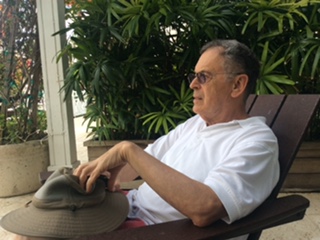Bloodlust and bayous
After We Drowned
by Jill Yonit Goldberg
Vancouver: Anvil Press, 2024
$22.00 / 9781772142273
Reviewed by Michael Greenstein
*

Jill Yonit Goldberg’s debut novel, After We Drowned, is absorbing, not just because of its page-turning plot, but also because of its deft delineation of character, setting, and atmosphere of ghost trees and marsh rats. The title refers to the aftermath of an explosion aboard an oil rig off the coast of Louisiana, as well as the PTSD that manifests. The four main characters—Emmett, his wife Angeline, and their son Jesse and daughter Willow Rose—suffer the consequences of the disaster from the rig where Emmett worked. An illustration of the rig accompanies each section of the novel, as if it were a six-legged beast slouching toward the bayou.
Although Jesse narrates most of the novel, some chapters are devoted to Emmett’s narration, and their telling in turn plays off against the courageous actions of their female counterparts. If Cormac McCarthy has charted the rig’s mysteries in his final novels, The Passenger and Stella Maris, and if Barbara Kingsolver has followed the impoverished lives of her addicted characters in Demon Copperhead, then After We Drowned probes the same demons and treacherous waters. In place of the milk of human kindness, these characters are nurtured on beer and cigarettes. Poised between the rig of the past and the uncertain road of the future, the novel immerses reader and character in the infested Gothic stream of the American South.
Each chapter’s title serves as a slanted guidepost to Goldberg’s tale, with many of the titles taken from phrases in songs that attest to the author’s lyricism. Consider the opening of Chapter One—“Jesse—Cruel Summer”: “Ever since the oil rig exploded, Daddy’s been obsessed with killing things.” Obsession (the title of a later chapter) points to the psychological damage inflicted on Jesse and his family, who kill things to stay alive—“Small animals mostly, so we can eat, but his bloodlust has gotten so bad that lately, when I catch his eye, all I can think of are the glowing, leaden pupils of the alligators that float up Bayou Lafourche.” Catching and killing are two of the novel’s obsessions in the hunting and haunting of the human spirit. An eye catcher, Jesse narrates through binoculars that Emmett bequeathes him to observe nature closely where alligators serve as reptilian rigs.

Surrounded by small animals and larger predators, the family of four lives in a shack with rotting wood and peeling paint. Emmett (whose name means true) “acts like life is a punishment, a bitter drink he swallows every single day,” along with his endless supply of beer. Despite all the destruction around him, he is a skillful worker able to fix so many things, except his own misfortunes. Fishing with Jesse, he sticks his hand under a log into a nest of catfish where he pulls out “a beast whose mouth closes around his elbow,” biting into his flesh. Man and fish become intertwined in the sludge where “water and death come together like twins.” Within this twinned world, even the glowing, leaden pupils of the alligators, match the rig’s fires. As opposed to his macho father, Jesse is incapable of killing the fish, and admits that at the age of fifteen he hasn’t even had sex yet. A son for all seasons, Jesse finds cruelty not only in the summer, but also in an entirely polluted ecosystem.
The second chapter, “Emmett—Twist of Fate,” shifts the narration onto the father, thereby introducing twists in style, structure, and point of view. That twist becomes “Wrapped Around Your Finger” in a following chapter, which in turn prepares for the introduction of Antoine, the villain with two fingers missing, who repairs cars and sexually abuses Angeline. She gives birth to Fortune, who dies in a car accident. “You Spin Me ‘Round” also points to the twists and interconnections of plot, character, and themes. The contrast between father and son is characterized as the difference between romanticism and classicism, but those categories cover only part of the truth. For the novel belongs more to late nineteenth-century naturalism, with life on the rig replacing the coal mines in the fiction of Thomas Hardy, Emile Zola, and D.H. Lawrence, where it becomes impossible to escape fate.
Although the males narrate, Angel and Willow Rose convey equally important messages. Emmett teaches Jesse how to use a gun, and Jesse in turn teaches Willow Rose. With one chapter, “Girls with Guns,” she is the one who pulls the trigger to shoot Antoine and become the hero of the novel. The chapter following the shooting, “Emmett—We Don’t Need Another Hero,” calls into question the nature of heroism in the face of so much adversity.
In addition to her four major characters, Vancouver area writer Goldberg (co-author of The Fire Still Burns: Life In and After Residential School) is equally adept in her portrayal of minor characters such as Jesse’s girlfriend, Lisette, who comes from a wealthier household in town. Similarly, cousin PJ, who has had three wives and five children, and is better off than Emmett’s family because of his oyster business, comes to life. His trailer is filled with cats, an alligator’s jaw, odd knickknacks, and a clock he made that ticks backwards—an assortment of Dickensian detail and American Gothic. The names of minor characters have a way of morphing through their own ecosystem of nomenclature. Adolphe becomes Dolphin and eventually Fin. Frank Allmendinger is the man whom Emmett fails to save on the rig, and whose widow he tries unsuccessfully to console. The portmanteau surname combines the paradox of mending, injure, dingy, and danger confronting all of the characters.
American regionalism is on full display throughout the novel, with Ernest Hemingway and Robert Pirsig accompanying the characters on the road. Hemingway’s The Old Man and the Sea makes an early appearance to comment on the persistence of character against nature and fate, but that novel is soon replaced by A Farewell to Arms, which begins with a picture of a river and a road. Even more significant is Pirsig’s Zen and the Art of Motorcycle Maintenance, with the contemplative life of reading opposed to the active life of riding.
By the end of the novel a hurricane bears down on the characters who manage to escape, leaving open the possibility of a sequel to After We Drowned. As rain batters their departing truck “like fists,” Jesse sits sandwiched between Antoine and Willow Rose, while Angeline takes the wheel. Jesse’s final perspective of displacement and redemption: “I am the one who turns and looks at everything we leave behind as we drive up the highway one last time.”

*

Michael Greenstein is a retired professor of English (Université de Sherbrooke) and the author of Third Solitudes, as well as some 200 essays and reviews on Victorian, Canadian, and Jewish literature. [Editor’s note: Michael Greenstein recently reviewed Barbara Black and Rhea Tregebov for BCR.]
*
The British Columbia Review
Interim Editors, 2023-26: Trevor Marc Hughes (nonfiction), Brett Josef Grubisic (fiction and poetry)
Publisher: Richard Mackie
Formerly The Ormsby Review, The British Columbia Review is an online book review and journal service for BC writers and readers. The Advisory Board now consists of Jean Barman, Wade Davis, Robin Fisher, Barry Gough, Hugh Johnston, Kathy Mezei, Patricia Roy, and Graeme Wynn. Provincial Government Patron (since September 2018): Creative BC. Honorary Patron: Yosef Wosk. Scholarly Patron: SFU Graduate Liberal Studies. The British Columbia Review was founded in 2016 by Richard Mackie and Alan Twigg.
“Only connect.” – E.M. Forster